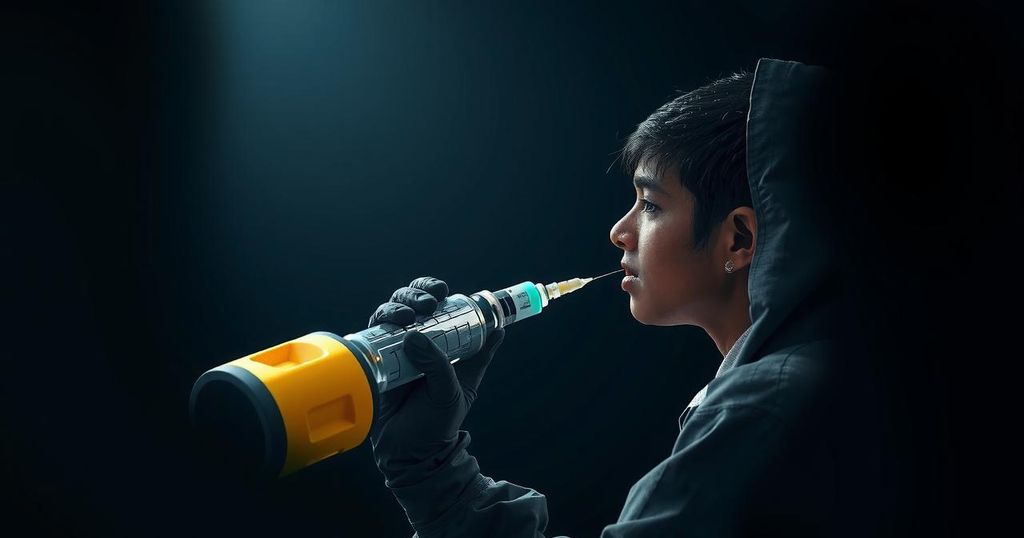Pakistan and Afghanistan have launched renewed polio vaccination campaigns amid a resurgence of polio cases, with 64 confirmed infections in 2024, an increase from last year. In Pakistan, 400,000 health workers aim to vaccinate over 45 million children, while Afghanistan targets 6.2 million children in its three-day initiative. Vaccine resistance and violence against health workers remain significant challenges in both countries’ efforts to combat polio.
Pakistan and Afghanistan have initiated renewed polio vaccination campaigns in response to an alarming increase in polio cases, with both countries remaining the last in the world where poliovirus is endemic. On Monday, Pakistan’s nationwide campaign commenced, aiming to vaccinate over 45 million children under five years of age through the efforts of 400,000 health workers. The need for this intervention arises after the World Health Organization reported 64 polio cases in 2024—41 in Pakistan and 23 in Afghanistan—an increase from six cases in each country the prior year. According to Ayesha Raza Farooq, the primary governmental facilitator for polio eradication in Pakistan, this campaign is the third of its kind for 2024, stemming from an outbreak of polio across 71 districts. The southwestern Balochistan province has been notably affected, accounting for more than half of the new infections, whereas Sindh province has reported a dozen cases this year. Anwarul Haq, the coordinator for the National Emergency Operations Center for Polio Eradication, emphasized the urgency of communal cooperation to safeguard children against this debilitating disease, asserting, “With the threat at an all-time high, we must act as one nation to keep our children safe through vaccination.” The resurgence of polio infections in Pakistan has been attributed to widespread vaccine opposition in rural areas, fueled by misinformation that suggests vaccination efforts are a tactic for Western sterilization of Muslim children. Furthermore, militants in regions bordering Afghanistan have been known to attack vaccination teams, resulting in numerous fatalities among health workers and security personnel in just the current year. In a parallel effort, Taliban officials in Afghanistan have launched a three-day vaccination drive targeting 6.2 million children in 16 provinces, with the campaign’s focus on areas neighboring Pakistan. This vaccination push, however, has faced interruptions, especially in Kandahar where Taliban authorities recently halted immunization efforts without explanation. This cessation was reported by the Global Polio Eradication Initiative as stemming from Taliban fears regarding covert surveillance. In the impoverished context of Afghanistan, eradicating polio poses significant challenges, demanding the integration of migrant populations into vaccination strategies and outreach towards hesitant communities. Experts also underscore the necessity of establishing a dedicated female healthcare workforce for effective implementation of polio initiatives.
The polio virus continues to cripple children in Pakistan and Afghanistan, the only two nations in the world where the disease remains endemic. Recent reports indicate a troubling uptick in polio cases, drawing attention to the urgent need for comprehensive vaccination drives aimed at eradicating this preventable disease. Distrust in vaccination programs, influenced by misinformation and violence from extremist groups in certain regions, exacerbates the challenges faced in achieving adequate immunization coverage. Both nations are now mobilizing resources and health workers to address these growing health threats and protect their vulnerable populations, particularly young children who are most at risk of paralysis due to polio.
In conclusion, the resurgence of polio cases in Pakistan and Afghanistan has prompted simultaneous vaccination campaigns aimed at eradicating the disease. Significant efforts are underway, involving extensive manpower and public cooperation to curb the spread of this virus. However, systemic issues such as vaccine hesitancy fueled by misinformation and violence against health workers pose substantial barriers to achieving successful immunization outcomes. As both nations strive to protect their children from the crippling effects of polio, their coordinated strategies and community engagement will be critical to overcoming these challenges.
Original Source: www.voanews.com






